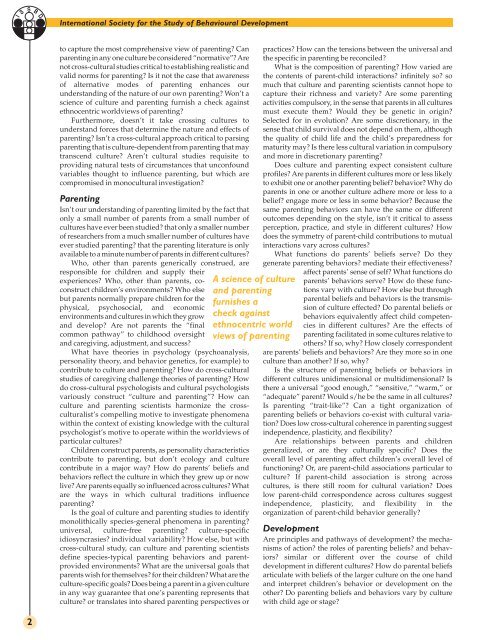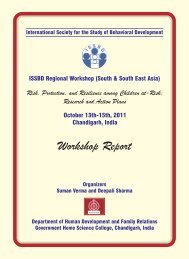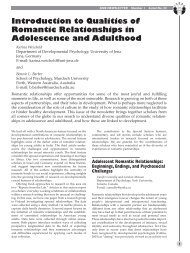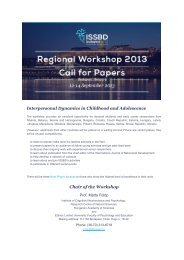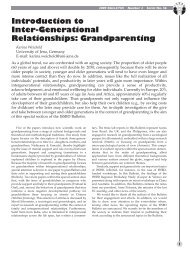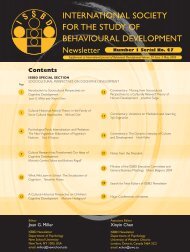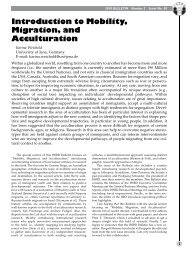Culture and Parenting - International Society for the Study of ...
Culture and Parenting - International Society for the Study of ...
Culture and Parenting - International Society for the Study of ...
You also want an ePaper? Increase the reach of your titles
YUMPU automatically turns print PDFs into web optimized ePapers that Google loves.
S<br />
I<br />
S<br />
B<br />
D<br />
<strong>International</strong> <strong>Society</strong> <strong>for</strong> <strong>the</strong> <strong>Study</strong> <strong>of</strong> Behavioural Development<br />
to capture <strong>the</strong> most comprehensive view <strong>of</strong> parenting? Can<br />
parenting in any one culture be considered “normative”? Are<br />
not cross-cultural studies critical to establishing realistic <strong>and</strong><br />
valid norms <strong>for</strong> parenting? Is it not <strong>the</strong> case that awareness<br />
<strong>of</strong> alternative modes <strong>of</strong> parenting enhances our<br />
underst<strong>and</strong>ing <strong>of</strong> <strong>the</strong> nature <strong>of</strong> our own parenting? Won’t a<br />
science <strong>of</strong> culture <strong>and</strong> parenting furnish a check against<br />
ethnocentric worldviews <strong>of</strong> parenting?<br />
Fur<strong>the</strong>rmore, doesn’t it take crossing cultures to<br />
underst<strong>and</strong> <strong>for</strong>ces that determine <strong>the</strong> nature <strong>and</strong> effects <strong>of</strong><br />
parenting? Isn’t a cross-cultural approach critical to parsing<br />
parenting that is culture-dependent from parenting that may<br />
transcend culture? Aren’t cultural studies requisite to<br />
providing natural tests <strong>of</strong> circumstances that unconfound<br />
variables thought to influence parenting, but which are<br />
compromised in monocultural investigation?<br />
<strong>Parenting</strong><br />
Isn’t our underst<strong>and</strong>ing <strong>of</strong> parenting limited by <strong>the</strong> fact that<br />
only a small number <strong>of</strong> parents from a small number <strong>of</strong><br />
cultures have ever been studied? that only a smaller number<br />
<strong>of</strong> researchers from a much smaller number <strong>of</strong> cultures have<br />
ever studied parenting? that <strong>the</strong> parenting literature is only<br />
available to a minute number <strong>of</strong> parents in different cultures?<br />
Who, o<strong>the</strong>r than parents generically construed, are<br />
responsible <strong>for</strong> children <strong>and</strong> supply <strong>the</strong>ir<br />
experiences? Who, o<strong>the</strong>r than parents, coconstruct<br />
children’s environments? Who else<br />
but parents normally prepare children <strong>for</strong> <strong>the</strong><br />
physical, psychosocial, <strong>and</strong> economic<br />
environments <strong>and</strong> cultures in which <strong>the</strong>y grow<br />
<strong>and</strong> develop? Are not parents <strong>the</strong> “final<br />
common pathway” to childhood oversight<br />
<strong>and</strong> caregiving, adjustment, <strong>and</strong> success?<br />
What have <strong>the</strong>ories in psychology (psychoanalysis,<br />
personality <strong>the</strong>ory, <strong>and</strong> behavior genetics, <strong>for</strong> example) to<br />
contribute to culture <strong>and</strong> parenting? How do cross-cultural<br />
studies <strong>of</strong> caregiving challenge <strong>the</strong>ories <strong>of</strong> parenting? How<br />
do cross-cultural psychologists <strong>and</strong> cultural psychologists<br />
variously construct “culture <strong>and</strong> parenting”? How can<br />
culture <strong>and</strong> parenting scientists harmonize <strong>the</strong> crossculturalist’s<br />
compelling motive to investigate phenomena<br />
within <strong>the</strong> context <strong>of</strong> existing knowledge with <strong>the</strong> cultural<br />
psychologist’s motive to operate within <strong>the</strong> worldviews <strong>of</strong><br />
particular cultures?<br />
Children construct parents, as personality characteristics<br />
contribute to parenting, but don’t ecology <strong>and</strong> culture<br />
contribute in a major way? How do parents’ beliefs <strong>and</strong><br />
behaviors reflect <strong>the</strong> culture in which <strong>the</strong>y grew up or now<br />
live? Are parents equally so influenced across cultures? What<br />
are <strong>the</strong> ways in which cultural traditions influence<br />
parenting?<br />
Is <strong>the</strong> goal <strong>of</strong> culture <strong>and</strong> parenting studies to identify<br />
monolithically species-general phenomena in parenting?<br />
universal, culture-free parenting? culture-specific<br />
idiosyncrasies? individual variability? How else, but with<br />
cross-cultural study, can culture <strong>and</strong> parenting scientists<br />
define species-typical parenting behaviors <strong>and</strong> parentprovided<br />
environments? What are <strong>the</strong> universal goals that<br />
parents wish <strong>for</strong> <strong>the</strong>mselves? <strong>for</strong> <strong>the</strong>ir children? What are <strong>the</strong><br />
culture-specific goals? Does being a parent in a given culture<br />
in any way guarantee that one’s parenting represents that<br />
culture? or translates into shared parenting perspectives or<br />
A science <strong>of</strong> culture<br />
<strong>and</strong> parenting<br />
furnishes a<br />
check against<br />
ethnocentric world<br />
views <strong>of</strong> parenting<br />
practices? How can <strong>the</strong> tensions between <strong>the</strong> universal <strong>and</strong><br />
<strong>the</strong> specific in parenting be reconciled?<br />
What is <strong>the</strong> composition <strong>of</strong> parenting? How varied are<br />
<strong>the</strong> contents <strong>of</strong> parent-child interactions? infinitely so? so<br />
much that culture <strong>and</strong> parenting scientists cannot hope to<br />
capture <strong>the</strong>ir richness <strong>and</strong> variety? Are some parenting<br />
activities compulsory, in <strong>the</strong> sense that parents in all cultures<br />
must execute <strong>the</strong>m? Would <strong>the</strong>y be genetic in origin?<br />
Selected <strong>for</strong> in evolution? Are some discretionary, in <strong>the</strong><br />
sense that child survival does not depend on <strong>the</strong>m, although<br />
<strong>the</strong> quality <strong>of</strong> child life <strong>and</strong> <strong>the</strong> child’s preparedness <strong>for</strong><br />
maturity may? Is <strong>the</strong>re less cultural variation in compulsory<br />
<strong>and</strong> more in discretionary parenting?<br />
Does culture <strong>and</strong> parenting expect consistent culture<br />
pr<strong>of</strong>iles? Are parents in different cultures more or less likely<br />
to exhibit one or ano<strong>the</strong>r parenting belief? behavior? Why do<br />
parents in one or ano<strong>the</strong>r culture adhere more or less to a<br />
belief? engage more or less in some behavior? Because <strong>the</strong><br />
same parenting behaviors can have <strong>the</strong> same or different<br />
outcomes depending on <strong>the</strong> style, isn’t it critical to assess<br />
perception, practice, <strong>and</strong> style in different cultures? How<br />
does <strong>the</strong> symmetry <strong>of</strong> parent-child contributions to mutual<br />
interactions vary across cultures?<br />
What functions do parents’ beliefs serve? Do <strong>the</strong>y<br />
generate parenting behaviors? mediate <strong>the</strong>ir effectiveness?<br />
affect parents’ sense <strong>of</strong> self? What functions do<br />
parents’ behaviors serve? How do <strong>the</strong>se functions<br />
vary with culture? How else but through<br />
parental beliefs <strong>and</strong> behaviors is <strong>the</strong> transmission<br />
<strong>of</strong> culture effected? Do parental beliefs or<br />
behaviors equivalently affect child competencies<br />
in different cultures? Are <strong>the</strong> effects <strong>of</strong><br />
parenting facilitated in some cultures relative to<br />
o<strong>the</strong>rs? If so, why? How closely correspondent<br />
are parents’ beliefs <strong>and</strong> behaviors? Are <strong>the</strong>y more so in one<br />
culture than ano<strong>the</strong>r? If so, why?<br />
Is <strong>the</strong> structure <strong>of</strong> parenting beliefs or behaviors in<br />
different cultures unidimensional or multidimensional? Is<br />
<strong>the</strong>re a universal “good enough,” “sensitive,” “warm,” or<br />
“adequate” parent? Would s/he be <strong>the</strong> same in all cultures?<br />
Is parenting “trait-like”? Can a tight organization <strong>of</strong><br />
parenting beliefs or behaviors co-exist with cultural variation?<br />
Does low cross-cultural coherence in parenting suggest<br />
independence, plasticity, <strong>and</strong> flexibility?<br />
Are relationships between parents <strong>and</strong> children<br />
generalized, or are <strong>the</strong>y culturally specific? Does <strong>the</strong><br />
overall level <strong>of</strong> parenting affect children’s overall level <strong>of</strong><br />
functioning? Or, are parent-child associations particular to<br />
culture? If parent-child association is strong across<br />
cultures, is <strong>the</strong>re still room <strong>for</strong> cultural variation? Does<br />
low parent-child correspondence across cultures suggest<br />
independence, plasticity, <strong>and</strong> flexibility in <strong>the</strong><br />
organization <strong>of</strong> parent-child behavior generally?<br />
Development<br />
Are principles <strong>and</strong> pathways <strong>of</strong> development? <strong>the</strong> mechanisms<br />
<strong>of</strong> action? <strong>the</strong> roles <strong>of</strong> parenting beliefs? <strong>and</strong> behaviors?<br />
similar or different over <strong>the</strong> course <strong>of</strong> child<br />
development in different cultures? How do parental beliefs<br />
articulate with beliefs <strong>of</strong> <strong>the</strong> larger culture on <strong>the</strong> one h<strong>and</strong><br />
<strong>and</strong> interpret children’s behavior or development on <strong>the</strong><br />
o<strong>the</strong>r? Do parenting beliefs <strong>and</strong> behaviors vary by culture<br />
with child age or stage?<br />
2


